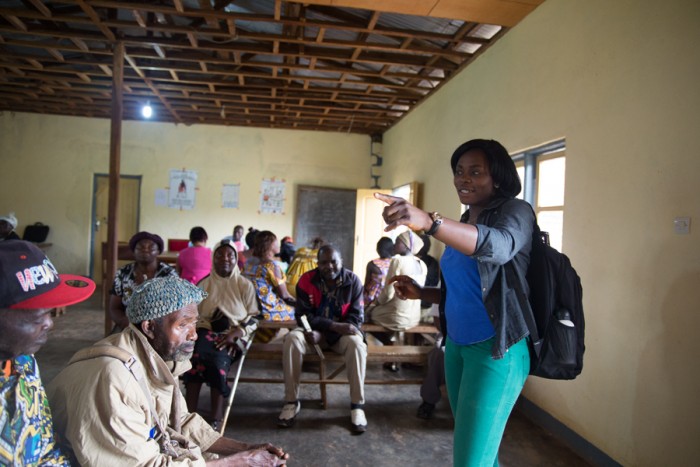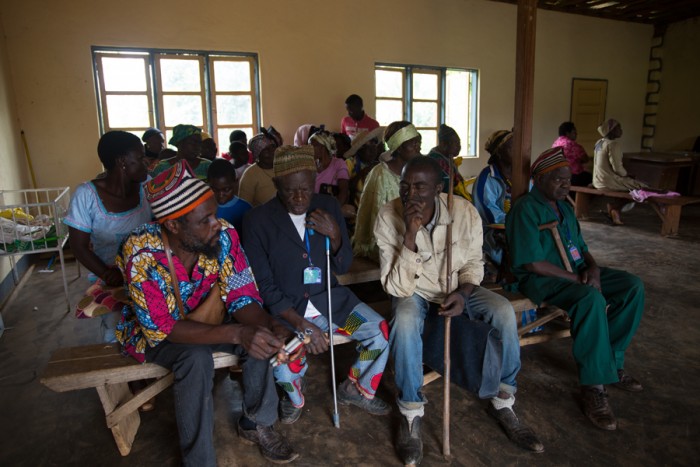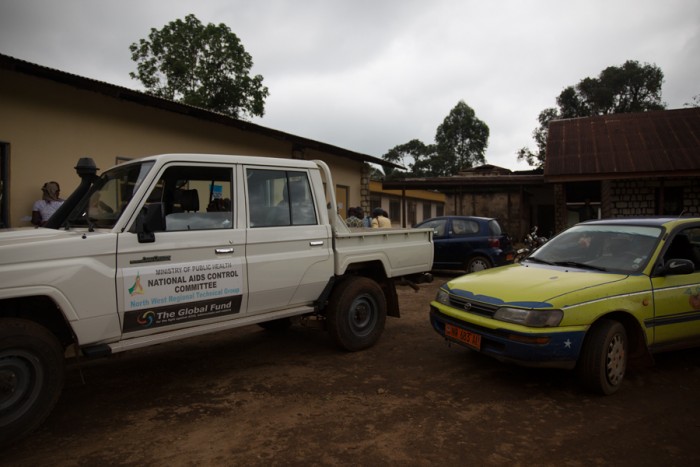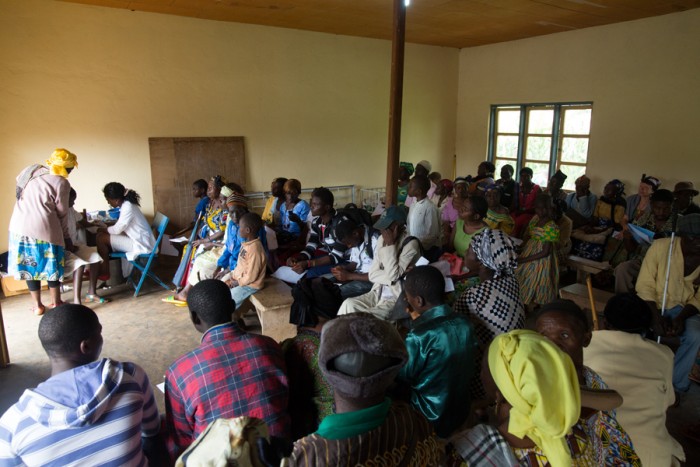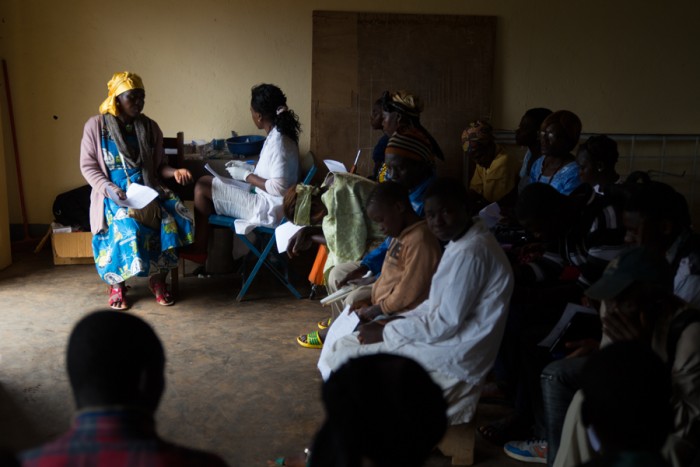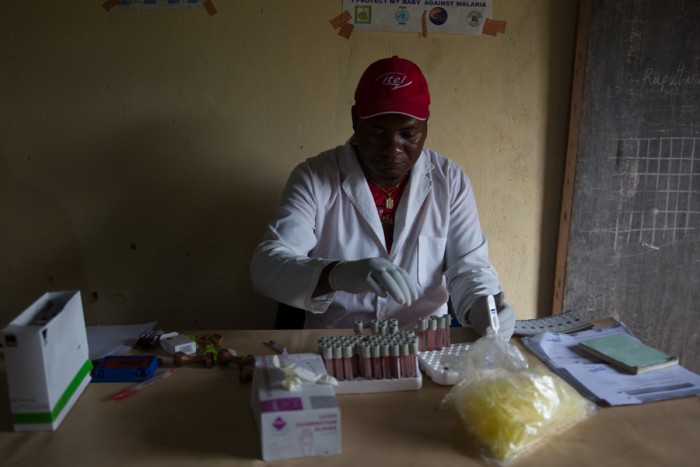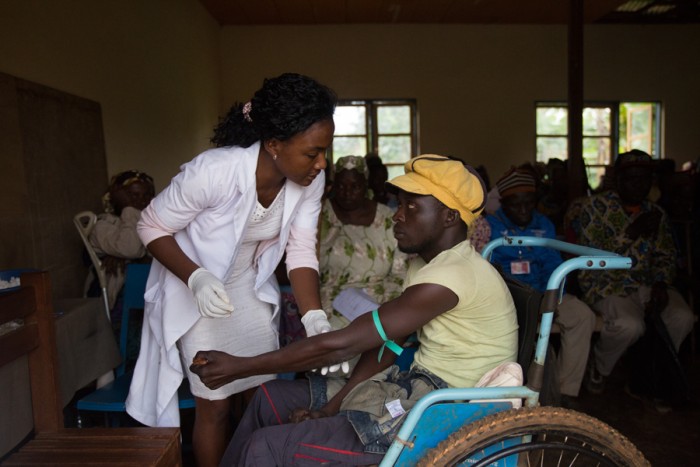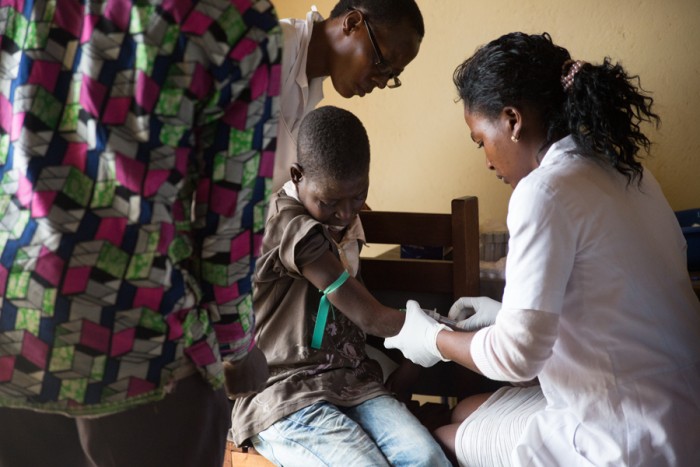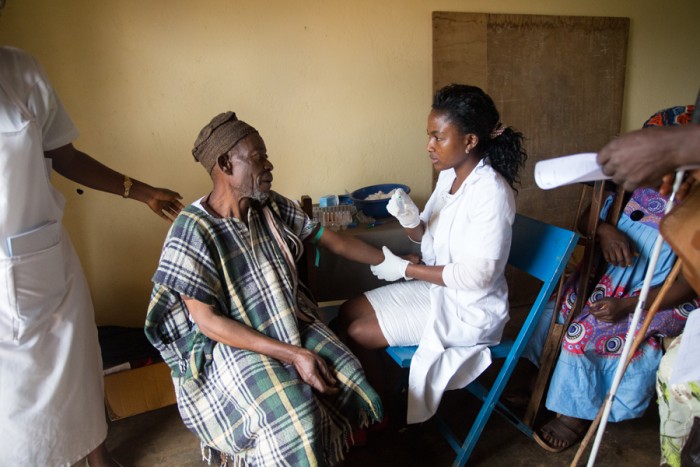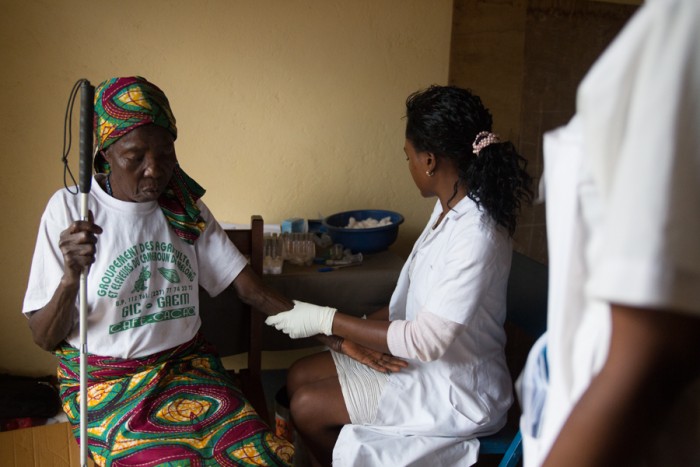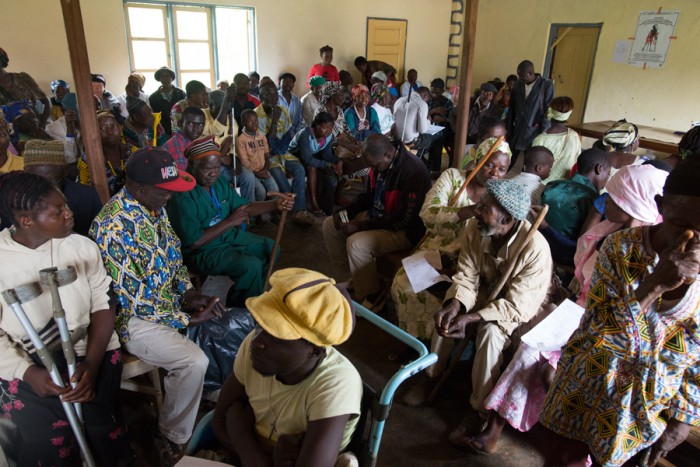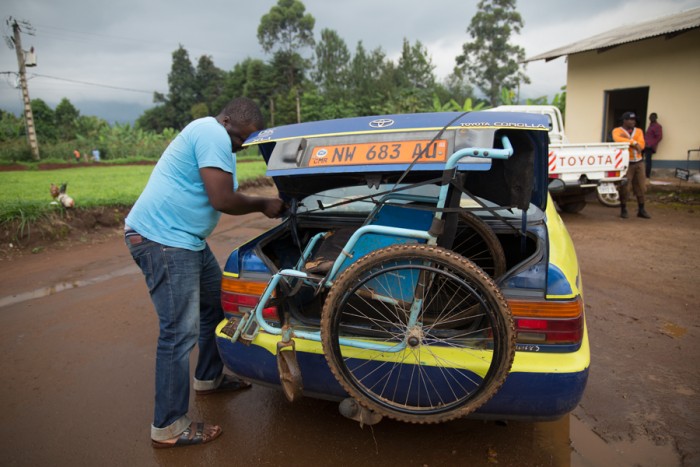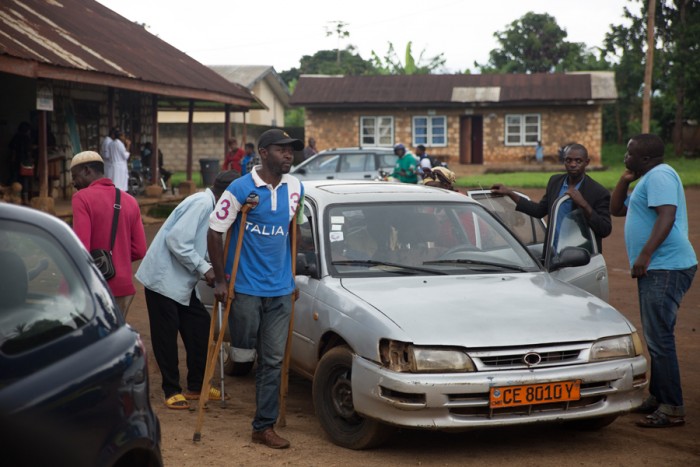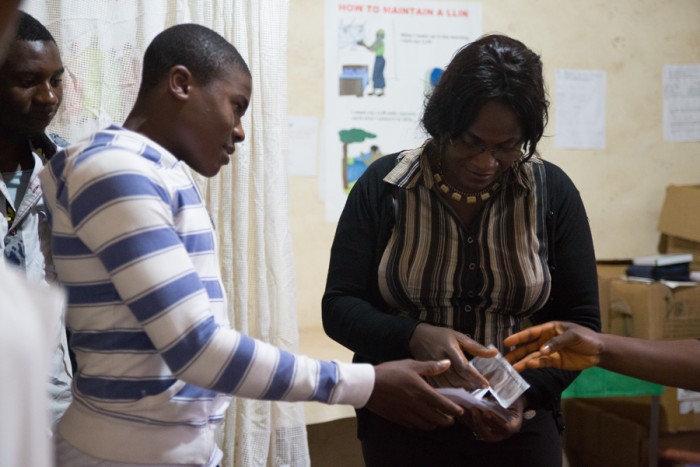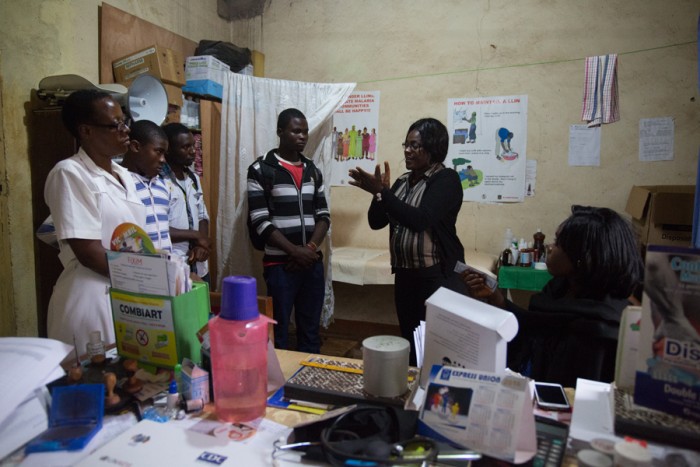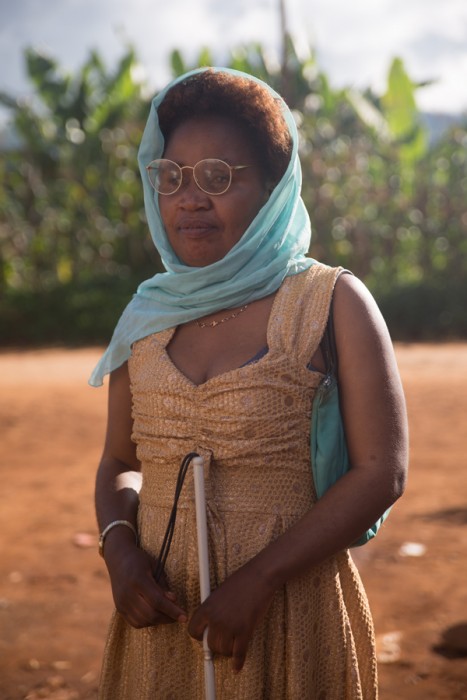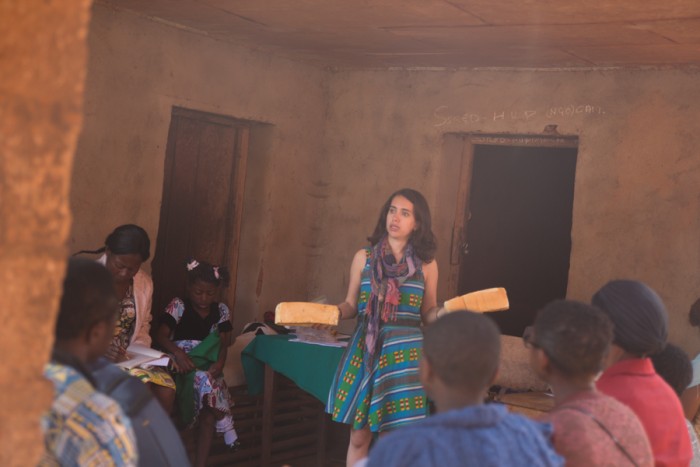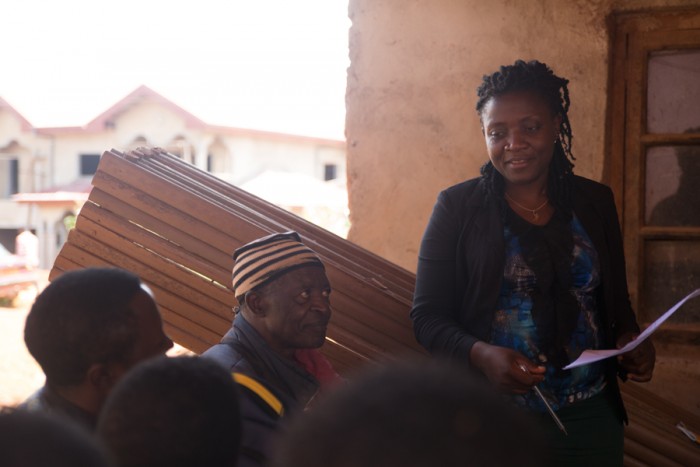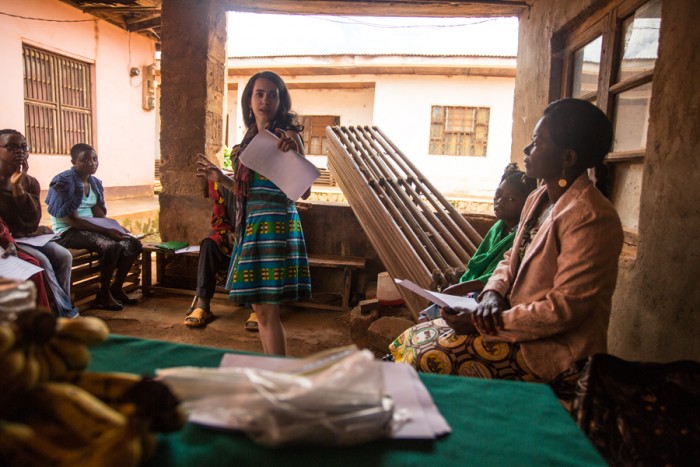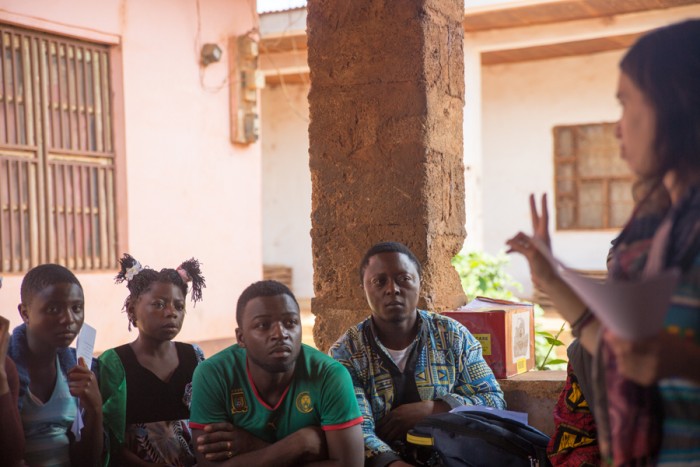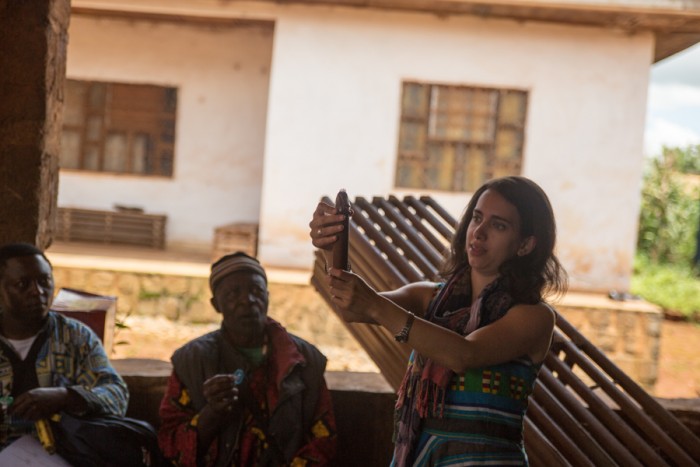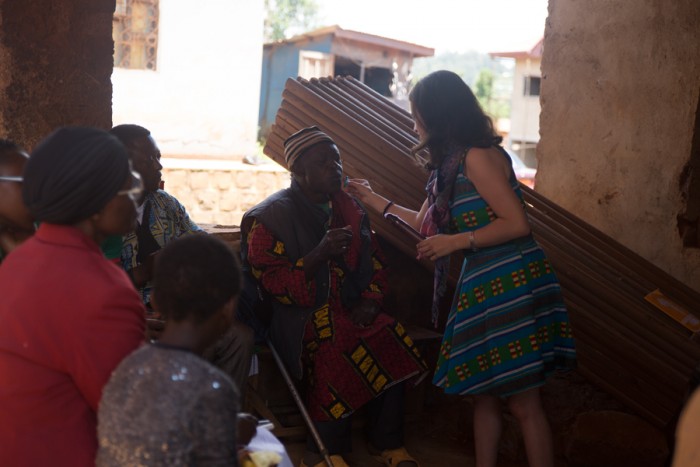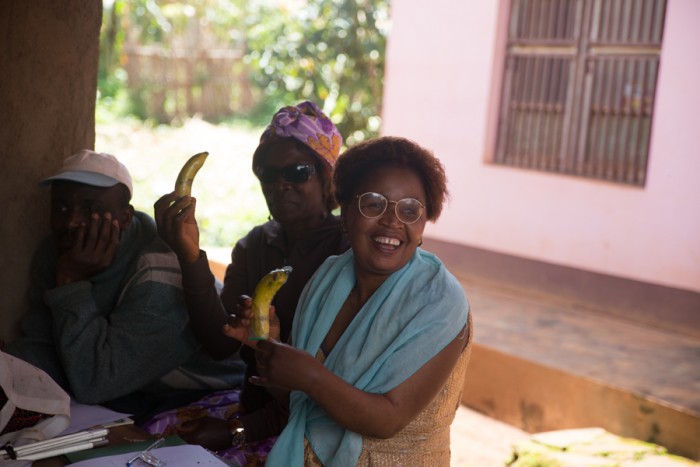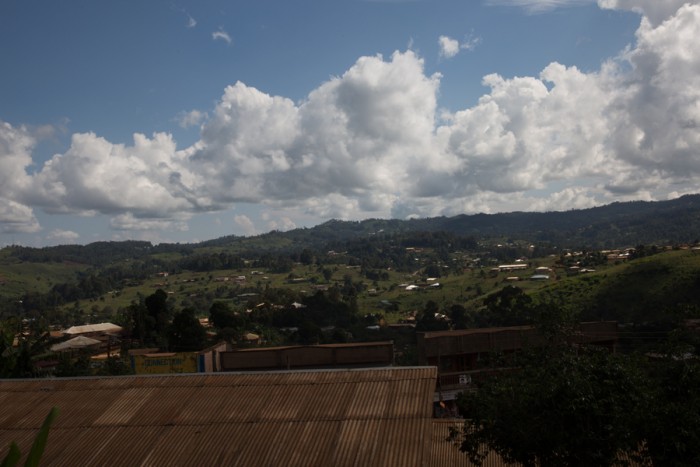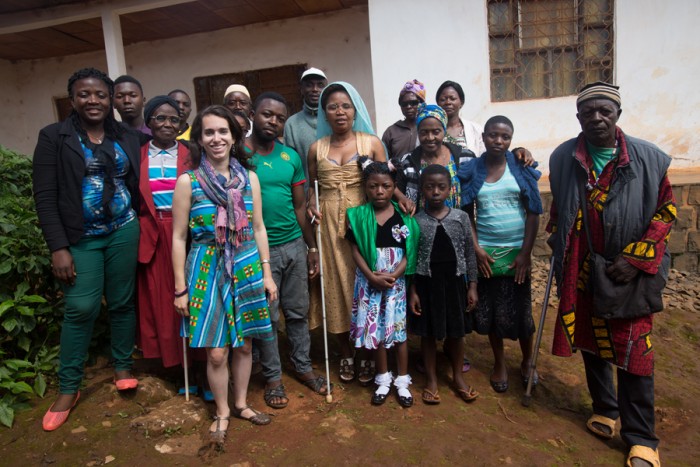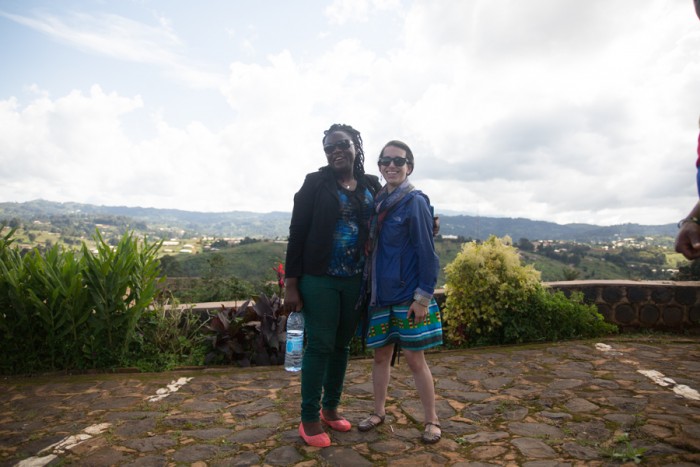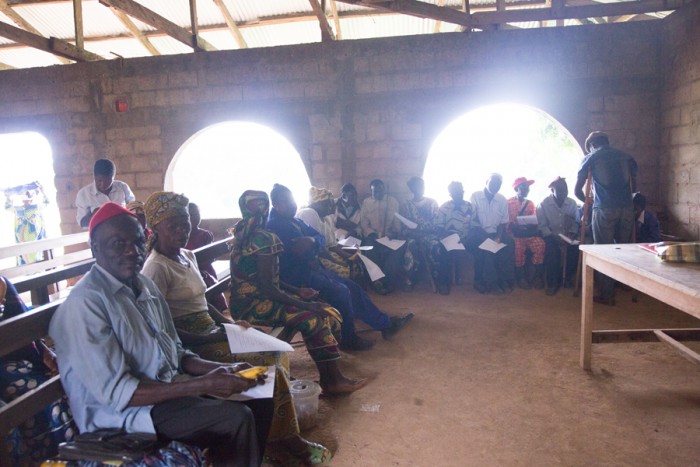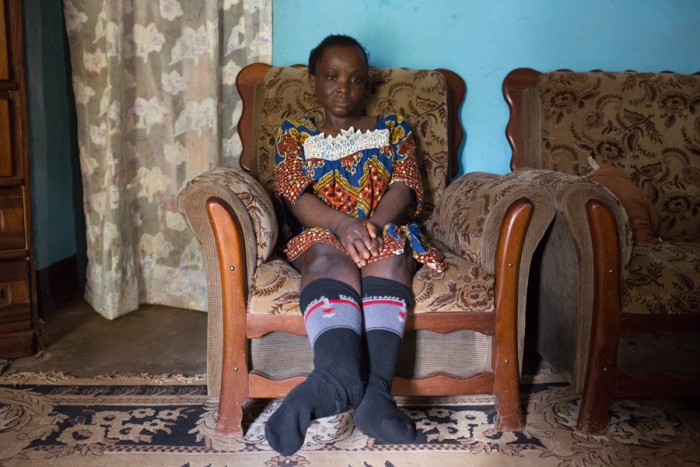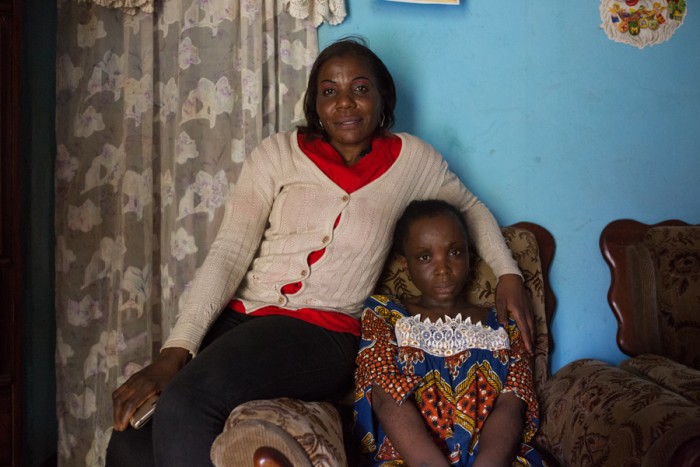August 4th, 2016 by Rachel | Tags: Disability, HIV/AIDS, Peace Corps | No Comments »
After conducting an HIV testing campaign on International Day of Persons with Disabilities on December 3, 2015 in Bamenda, my work partners and I decided that we needed to reach out to persons with disabilities beyond Bamenda by testing persons with disabilities from rural communities. On June 28, 2016 in collaboration with Coordinating Unit of Association for Persons with Disabilities, Bamenda Regional Hospital, and Tubah Health Center, we organized an HIV testing campaign located in Bambili, a village outside of Bamenda. The HIV testing campaign was funded by U.S. President’s Emergency Plan for AIDS Relief (PEPFAR), for which I applied and was awarded. PEPFAR did not only fund the testing itself. It also funded transportation to assist persons with disabilities in commuting from their homes to the HIV testing campaign site. This fund was extremely crucial for the success of the HIV testing campaign because so many persons with disabilities stay in homes and never leave the home due to the environment and lack of resources such as wheelchairs and white canes that make difficult for them to move. We also received community contributions, which included an interpreter for the deaf, a registrar to assist in registering people and also a mobilizer to spread the word about the testing campaign. About 120 persons with disabilities from four different villages in the Tubah sub-division, Bambui, Bambili, Kedjom-Keku, and Kejoum Ketingoh were tested for free of charge. 60 participants were tested for the first time in their life. 10 were tested positive. That is 8% of all participants. Four of them learned for the first time that they were HIV-positive. It’s important to note that because there were caregivers at the event to assist persons with disabilities in bringing them from their homes to the HIV testing campaign site, a few may have taking part in testing and so, there is a chance that a small number out of 120 participants were not persons with disabilities. We could have reached out to so many more persons with disabilities. Because rain came pouring hard on this day, the cost of transportation unexpectedly went up, which resulted us having to turn away so many from the HIV testing campaign event.
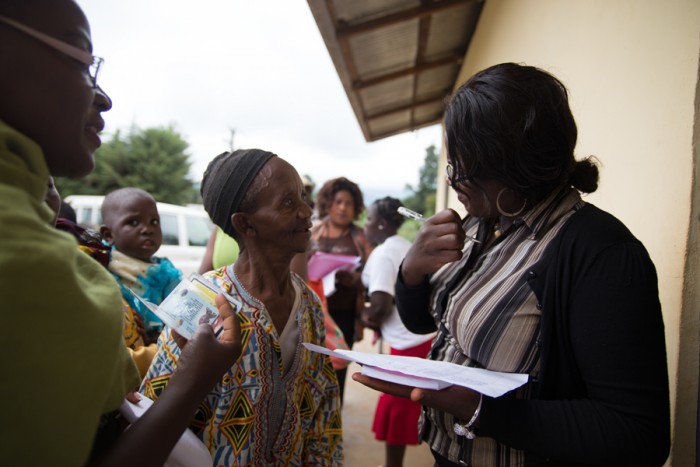
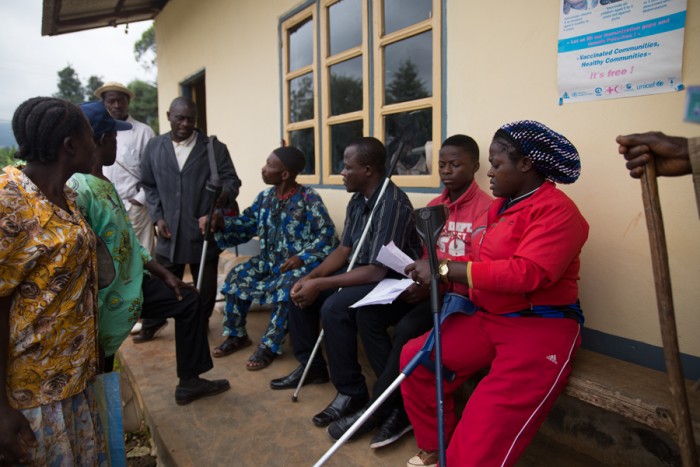
August 4th, 2016 by Rachel | Tags: Disability, Peace Corps, Persons with Disabilities of Cameroon, Photography | No Comments »
During the last seven months of my Peace Corps service, I am featuring photographs and stories of several persons with disabilities living in Cameroon. All the photos are part of a series called “Persons with Disabilities of Cameroon.” The goal of presenting photographs and their stories is to create better awareness about the plights that persons with disabilities face in a developing country. When I return to the US, I hope to exhibit this series in a gallery and publish a book to educate others about persons with disabilities living in developing countries as this topic is so rarely discussed in the media.
A woman with disability, Eba-Dylis, who is from Kumbo, a town located two hours east of Bamenda, was born in 1976 in Kumbo with no disability.
Then one day in 2007, her life was changed forever.
“I came to Bamenda to obtain a driver’s license to go to UK [and to see my sister]. So a few days later, I was watching a TV, a Nigeria cassette at 12 PM. Then I yawned. At that moment, I could not see. Then I closed my right eye so that I could see if I could see out of my left eye but I could not see anything. I could not see anything out of both of my eyes. I asked my younger sister’s doctor to look into my eyes. She told me that the eyes were red. I sent her to a store to buy the medicines and eye drops. When she bought it, I put the eye drops in my head. She told me that blood was coming out of my eyes. Immediately my younger sister came into the house and asked me where the blood on the pillow came from. I told her from my eyes. Then we went to the hospital. I was told that my eyes were highly inflamed. At this moment, I wasn’t seeing anything at all. The doctor told me that he has to give me some tablets to take everyday in the hospital so that he can see the reaction. I went for five days. On the fifth day, the doctor gave me tablets for Saturday and Sunday and told me to come on Monday. While at home, my sister’s friend, a girl who is a traditional herbalist came to me with cowries she drew from the ground and she told me that she has seen that I am traveling to a white man country and I accepted it. Then she said that she sees [spirituality] herbs in my hands which indicate that I will be a traditional herbalist. She said that if I go to the white man country, I will have a mental problem.”
Eba-Dylis later clarified to me that she never told the traditional herbalist that she was going to the UK. The traditional herbalist drew the conclusion herself.
“Then she informed me to go to a traditional herbalist who is a grandfather who knows more about traditional medicine. She also told me to get enough money to buy goats, palm wine, cowries, salt and palm oil to give to the grandfather so that he can bless me and wash me so that I can see again. I left Bamenda for Kumbo early in the morning to see the grandfather. When I left for Kumbo, I went to my auntie’s house. I told her to join me to the grandfather’s place and she refused. And since I was needed to go out of the country, I went to my grandfather’s place alone. While there, he said the cause of my blindness is the forces of the other world. They are responsible for my blindness. At that time, I called my first son from school to come join me at my grandfather’s place to start the treatment. While there, he used a stick and dropped in a potion he made and wrote with it on a board. Then he washed the board and took liquid from the board that he washed off and dropped it in my eyes. The minute he dropped it in my eyes, my eyes and all my head was burning. My son had to put cold water on my head. It continued like that for three weeks. So my mother who was in Douala was very angry about it. She assaulted the grandfather and told me to go away from the grandfather’s place. She asked me why I would prefer traditional healer even though I was a nurse by profession. I told her I decided to go to a traditional healer and was sent to the traditional healer by another traditional healer. I believed much in the traditional healer [first one] because she told me that she has seen that I’m going to the white man country although I had not told her. She knew I was going to the UK from drawing the cowries. At this moment, my mother and I left for hospital where I was diagnosed that the retinas have been detached from the lenses. For that reason, I’ll never see again. From then, I went to the School for the Blind in Kumbo for nine months and then I finished school. Then I became a volunteer at my paris for one year. That same year, 2008, I formed an association for persons with disabilities called ‘Foomonyuy’ which means god’s gift. Then in 2010, I founded Bui Women with Disabilities. Then in 2013, I got a certificate in counseling. Presently, I am a volunteer with TC Africa Incorporation in USA. They work with persons with disabilities, people living with HIV, and street children. I identify persons with disability and bring them to the office.”
Before she went blind, she was a nurse at a private clinic in Douala, Cameroon’s second largest city. She had to stop working as a nurse when she became blind. She never had the chance to go to the UK. She is now living with obstacles.
“I have so many challenges. Getting a job for instance, last year, department of HIV Treatment at General Hospital in Bamenda had entrance examination for social counseling. I was the last person to go and take the exam. The first question was ‘How are you going to work when you don’t have eyes?’ I said, ‘I have come because I can do the work and I have my laptop with the speech program that can help me read the text.’ I was not taken. They have taken those who don’t have a certificate in counseling. I believe they bribed them with money.”
July 31st, 2016 by Rachel | Tags: Disability, Health, HIV/AIDS, Peace Corps, Sexual Reproductive Health | No Comments »
Yesterday, Antonia, the mother of a child with Down Syndrome and an incredible advocate for all people with Down Syndrome and other persons with disabilities, and I traveled to Kumbo, the second largest town in the Northwest region located about two hours from Bamenda by car. The drive was beautiful as we traveled through the mountains that were covered in green grass. When we arrived, we realized there were miscommunication, a common occurrence in Cameroon. “Where are we supposed to go?” said Antonia.
“Ummm. I thought Ruth gave you the information?” I said.
“No. She didn’t. I thought you had the information,” she said.
We contacted Ruth right away and received information from her. Ruth assisted in coordinating my visit to Kumbo. Then when we arrived at the place where we were supposed to have the workshop, a number of persons with disabilities were standing outside of a building that was closed. The president of the group tried to open the building but was unable to do it. So, we moved the workshop to a different location. It took place outside, on a porch by a building. As I tell the group that I came to teach HIV prevention and sexual reproductive health, the president informs Antonia and me that she was told that I was coming to teach her disability group about organizational management. She then said that because she thought she was told that I was going to be teaching about how she and other participants can improve their organization, only the officers of the group were invited. The president said that if she had known that I was going to be teaching about HIV prevention and sexual reproductive health, she would have invited all members of the group. So, she pulled out her phone right away and called other members asking if they could come right away at the last minute. We waited for some time for other members to show up. We went ahead with HIV prevention section after waiting for some members who still have not yet showed up. Then, just as I start the sexual reproductive health section, two additional members showed up.
In spite of miscommunication and lack of attendance of many members, the president showed a strong interest in wanting to replicate my workshop and asked me if I could provide her materials so that she could teach it to all the members of her group. She told me that she is coming to Bamenda the following week. We agreed to meet, and I would then provide her with the curriculum and share information with her on how to teach what I taught. This was a very heart-warming moment because that is what Peace Corps about. Peace Corps is about teaching the community skills and encouraging them to replicate what they have learned from the volunteers.
Participants demonstrated good knowledge of HIV prevention as evident on the pre-test as four participants scored 100% and all others missed only one answer. The results were similar on the post-test although the results were a little strange as three participants scored 100% and while all the others missed one answer, one missed two answers. While two participants improved by answering one more answer correct than the pre-test, three missed one more answer than the pre-test.
On the Sexual Reproductive pre-test, most participants did poorly as only three out of eleven scored 90% or better, two scored in the 70’s percent and the rest did below 70%. On the post-test, the participants improved as four scored 90% or better, three scored in the 80’s percent and two scored in the 70’s percent and only one scored below 70%. What was striking is that on the post-test, I asked “Have you been forced to have sex?” Five out of eight females said “Yes” while all the males said “No.” Also, on the pre- and post-test, one question stated, “Men are responsible for helping women avoid pregnancy.” On the pre-test, two circled “No.” Meanwhile, on the post-test, all circled “Yes.”
At the end of the workshop, the president treated Antonia and me with a big bag of plantains and a big bag of potatoes to take back to Bamenda.
July 28th, 2016 by Rachel | Tags: Disability, Health, Peace Corps, Sexual Reproductive Health | No Comments »
Last Sunday, I went with Samuel, one of my work partners, to Kedjom-Keku, a village located about an hour from Bamenda to present Sexual Reproductive Health to 29 persons with disabilities. Most of the participants were older adults who were illiterate. This meant that when conducting the pre- and post-tests, we needed to read each question and choices of answers to each persons with disabilities individually. During the pre-test, Samuel and I together assisted half of the participants with the test while an officer of the disability group assisted the other half.
After conducting the pre-test, I presented information on Sexual Reproductive Health, which included information about family planning, contraception options, and sexual consent and condom demonstration. As evident on the pre-tests and also post-tests and from the conversations with the participants, it was clear that for many of them, it was their first time learning about all different contraception options. Because most did not know grammar English, Samuel took the time to translate what I said after every few sentences. For example, after talking about the benefits of using an injection, Samuel would then translate and then I speak about the problems of using the injection. After I spoke about the problems of using the injection, Samuel then translated.
Then, when the presentation was done, the officers of the group relayed to Samuel who then relayed to me that they would like to talk about group’s business matters and asked if they could do the post-test while talking about the business matters. I said, “No problem.” Because I needed Samuel to assist me in conducting the post-test, I stood and waited for him for several minutes while he took part in participating in discussing the business matters with the group. Then when I went to Samuel and asked him when can we conduct the post-tests, he then said “now.” The next thing I see is several persons with disabilities handing the test to an officer, not the one who assisted in conducting the pre-tests. I immediately went up and said, “Wait! Wait! They need to take the post-tests.” The officer said that he already helped them complete the post-test. I then looked at the post-tests, and it was clear that the participants did not take the tests themselves because everyone marked the exact same answers. I then scolded to the officer, “You cannot take the tests for them. This is fraud. This is corruption! You need to ask each person every question. You need to let them answer the question. The answers must come from their own brain! We need to hand the tests back to them.”
I am not sure how I missed seeing the officer completing the post-test for them. I must have been distracted and didn’t notice. We then handed the tests back to everyone who handed in the tests. Samuel and I then went to each participant individually and asked every question and read every answers. We let them dictate their own response. We went to every single person because even though I asked the officer to go back to each of them and ask every question and let them respond on their own, he still didn’t do his job. So, Samuel and I both went to every single participant to ensure that we get a true and accurate result. This is what Samuel and I both discovered when we went back to almost every individual to complete the post-test:
The first question was “Family planning affects the health of children.” The answer choices were “True” and “False.” The correct answer is “True.” The officer answered “False” for every participant for whom he took the test. Meanwhile, when Samuel and I both went back to most of them, they all answered “True.”
Then one of the following question was “Circle all contraception options” and the answers included condom, birth control pill, injection, implants, IUD, exclusive breastfeeding for six months, and abstinence. The officer circled “condom” and “abstinence” for every participant for whom he took the test. When Samuel and I went back to most of them, they all said to circle all or most of them.
Then one of the following question was “Have you been forced to have sex?” The officer circled “no” for all of them. Meanwhile, when we went back to all women, some of them said, “yes.”
Then for the last questions, “Do you have access to contraception?” and “Do you use any contraception? If yes, circle which one.” the officer circled “Yes” as if they do have access to conception and circled “Condom” and “Abstinence” for every participant. Meanwhile, when Samuel and I went back to most of them, almost all of them said they do not have access to any contraception options and do not use any.
Samuel and I had a very good discussion after the workshop about the situation of testing the participants. I do not know what the officer’s intention was but if his intention was to make his group look good by trying to give all of them 100%, that did not happen because he answered some of the questions incorrectly for all of them. I explained to Samuel that even if they don’t all get 100% on the post-test, it’s always important to get true and accurate results so that we can see what information they still do not understand so that we can know what we still need to work in helping them improve their knowledge of health. Even for the questions that were personal and had no right or wrong answer, it was still important to get accurate responses so that we can have a clear understanding of what challenges they are facing so that we can see how we can improve their situation.
After evaluating the tests, the results show that while everyone did poorly on the pre-test, 14 out of 29 scored 100% and additional 6 scored almost all correct, 88% or above. Then additional 3 scored 72%. If we had taken the results from the post-test that included the answers selected by the officer who was answering the questions for many of them from his own brain, we would have had many scoring 75%. Meanwhile, most participants did better than the officer as they scored 100%!
July 27th, 2016 by Rachel | Tags: Disability, Peace Corps, Persons with Disabilities of Cameroon, Photography | No Comments »
During the last seven months of my Peace Corps service, I am featuring photographs and stories of several persons with disabilities living in Cameroon. All the photos are part of a series called “Persons with Disabilities of Cameroon.” The goal of presenting photographs and their stories is to create better awareness about the plights that persons with disabilities face in a developing country. When I return to the US, I hope to exhibit this series in a gallery and publish a book to educate others about persons with disabilities living in developing countries as this topic is so rarely discussed in the media.
Therese is a young, quiet woman in her 30’s who is unable to walk, has bowel movement issues, has never been to school and never left home. When I spoke to her, she was very shy and spoke very softly. She lives with two of her sisters and her parents. One of her sisters shared Therese’s story with me.
“When she was born, she had something on the lower end of her back and water was coming out of it. She spent one month at Bamenda Regional Hospital. And then they transferred her to a polyclinic in Upstation. From there they transferred her to Yaounde. She spent nine months in Yaounde. They operated her in Yaounde. After that they gave her quinimax injections. Her head was big and she could not stand. She returned to Bamenda. She was crawling since she cannot stand. Her feet turned outwards from crawling. She cannot control her stool,” said elder sister Esther.
As Esther was sharing her story, I was thinking in my head, “This condition sounds like spina bifida.” I asked them if they were familiar with “spina bifida” and they said “no” and have never heard of the term. I explained to them that it’s a condition where a person is born with a lesion on the lower back, which is caused by the spine not closing completely during the pregnancy of the mother. This results in some growing up unable to walk and having bowel movement issues.
Therese visited a nearby rehabilitation center when she was a child and tried leg braces. “They did not work and she doesn’t use it,” said Esther.
Esther who has been taking care of Therese all her life said that she needs adult diapers but cannot afford them even though they are available for purchase in Bamenda. She said that if she could have adult diapers, she could leave the house. She stays at home all day and never leaves the house. She hasn’t been outside at all. “She doesn’t know any places around here. She had only heard the names,” Ruth, my work partner who introduced me to Therese and accompanied me to her home told me. Esther added that she is too shy and she doesn’t want people to see her.
She has never been to school all her life. “She cannot write,” said Esther. When I asked Esther why she has never been to school, she said it’s because of her bowel system, and they were unable to find transportation to take her to school. All of her other seven sisters completed secondary school.
When I asked Therese what she does every day, Esther responded saying that she arranges eru for the aunts to sell everyday. She cracks eru, an African wild vegetable, to sell. She washes her family and her dresses. She helps arrange the house by putting things such as shoes and clothes in order. Esther added, “She can dry clean and do house chores by crawling.”
I asked Esther what challenges she faces in helping Therese and she said, “I carry water for her when she wants to wash her dresses. When she poops, we carry it out. When she wants nice things like food, we go out and buy it for her. We always advise her. She is always angry.”

